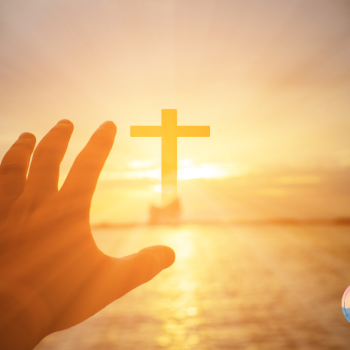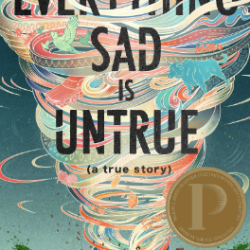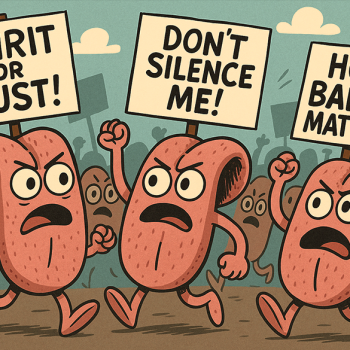The people take one look at the gleaming calf and proclaim, "These are your gods, O Israel, who brought you up from the land of Egypt" (Ex. 32:4b). Now it is not Moses who has brought them out of Egypt, but this new-made calf. So they step another pace away from the true source of their freedom. Whatever Aaron had in mind for his calf, it has now become another stumbling block for the people he has been charged to lead. So, he tries to salvage the brewing disaster by building "an altar in front of it (the calf) and preaching, 'Tomorrow will be a feast for YHWH!' (Ex. 32:5).
And in the morning the people go through the motions of a typical YHWH service. "They sacrificed whole burnt offerings and brought peace offerings near," no doubt with smiles of piety on their lips, dressed in their finest worshipping garb. But then, their real intent shines through. "They sat down to eat and drink (dinner on the grounds after worship), but then got up to…"(Ex. 32:6). What they do at this point is locked into the wonderful verb, tsahaq. This verb may mean "to laugh" as it surely does in Genesis 21 when Sarah names the child of her extreme old age "laughter" (Yitsaq). However, in another place in the Genesis saga, (Gen. 26:8), King Abimelech of Gerar catches this same Yitsaq "fondling" (yitsaq) his wife Rebekah, though the king has been told that Rebekah is really Isaac's sister. Clearly, this "fondling" is not something that a brother and sister engage in!
And so it is at the base of the holy mountain. The people who worship the calf, made by Aaron, fall to "fondling" one another, or perhaps better said, they proceed to leave their phony YHWH worship behind as they descend into acts that ought not be named. And this appalling behavior is the direct result of Aaron's creation of the molten calf at their loud demand.
It is obvious that Aaron wants it both ways. He wants to be a leader of the chosen people, but he is finally terrified of what they want. "Make us gods," they say, and he willy-nilly makes them gods. But when they decide that this calf is just what they have been waiting for, they turn their full allegiance to the calf, and forget both Moses and YHWH. And then Aaron tries to pull the fat out of the roaring fire by building a Hebrew altar right in front of the calf, perhaps attempting to obscure the thing behind the sacred stones. And he leads them in Hebrew worship, but it is far too late. The minute Aaron retires to divest and head to the manse for prayer (or something; he is after all not in any of the verbs of 32:6), those people he would lead run wild and engage in acts far from those YHWH had in mind for them. Aaron may wish to lead, but his leadership is a complete failure. He has led them, all right, directly into the arms of a false god and devastating actions.
Well, why not a bit of calf and a bit of YHWH? Do we not regularly hedge our bets in similar ways? Do you have an American flag in the sanctuary? Surely a little nation worship can rest easily with a little YHWH worship? I praise each Sunday "the God from whom all blessings flow," but on Monday I check the market to see if my retirement is secure. I pray to God, "who made the sea and all that is in it," but I live as if God's good creation will last forever as it is, even if I continue to contribute to the fouling of the seas and the heating the land. Do not imagine that Aaron is dead; he is alive in us whenever we try to have it both ways: a little bit of YHWH and a little bit of the calf, too. And Moses confronts us as he confronted Aaron, "What did this people do to you that you have brought on them a great sin?" (Ex. 32:21). And Aaron lied, big time, by claiming that the gold he received from the people magically popped out of the fire as a calf (Ex. 32:24)! But, of course, it did not; Aaron did it carefully and purposefully. And so do we whenever we want to have it both ways. Jesus said, "You cannot worship God and gold," and he was surely right. It is far past time that we try to have our worship, our practice, our lives both ways. Either YHWH reigns or YHWH does not. The choice is always ours.





